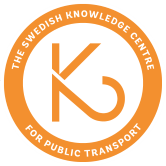
Public transport both affects, and is affected by, complex relationships with other functions and events in major cities and their surrounding areas. The planning, implementation and operation of public transport therefore needs to be more integrated with other spatial planning. This particularly applies in relation to issues concerning strategies and plans for urban land use and planning, but also in relation to other social functions at local, regional and national level, such as healthcare, education, environment and regional development. Public transport must also be planned in an integrated manner with other types of traffic, to better integrate cycling and public transport.
Digitisation will facilitate the emergence of new demand-driven or shared mobility services and new business models for combined-service passengers that can compete with or complement today’s public transport services. The introduction of autonomous vehicles can accelerate and reinforce the effects of such a trend. This development creates opportunities, but also challenges, for example, for personal privacy, for various individuals’ access to a changed mobility landscape, for costs and for the ability to achieve climate targets and environmental goals.
Overall research issues
Although most public transport will be provided by existing services for the foreseeable future, digitisation and new mobility services will entail a major change for passengers and commercial operators in and around public transport. This trend also affects the way in which public transport is organised, which actors are involved, and their different strategies. New solutions also affect the conditions and requirements for the physical design of the transport system and the public transport services offered.
Research is needed on the following, broadly formulated issues:
- How can behaviour be changed as a result of digitisation generally, such as changes to the organisation of working life, and to new mobility services in particular? What do such behavioural changes mean for passengers and for the demand for public transport at different times and places in the city or the surrounding area? How does it affect public transport costs and socio-economic efficiency?
- What kind of individualised and context-conscious information can support combined-service travel from a passenger's perspective? How can this be adapted for passengers with different circumstances and requirements?
- How can resilient collaboration and business models, including information sharing, be designed for different types of combined-service traveller, which include both traditional public transport, new mobility services, walking and cycling, in ways that lead to more sustainable travel in cities and regions?
- How can public transport services, including special passenger transport, be affected by new mobility services, e.g. in a city’s suburbs or periphery, or where there are few passengers? How does this affect society's responsibility to provide and finance public transport, and how can public transport authorities and other societal actors take advantage of the opportunities provided by new solutions?
- How is the physical environment impacted by digitisation and the new mobility services, e.g. the location and design of interchanges? What does this mean for urban and infrastructure planning locally, regionally and nationally?
Expected results
The research is expected to contribute to an increased understanding of how new technology and new services can affect public transport. It includes increased knowledge about how people with different needs and circumstances choose to travel when new opportunities for mobility and information are offered. This knowledge helps to make the regional public transport authorities, municipalities and other relevant actors better equipped to handle opportunities and risks in the mobility landscape of the future, and increases their strategic ability to influence trends in a direction that leads to more sustainable travel.
